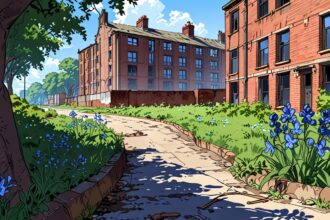Since making history as the UK’s first majority Green council in May 2023, Mid Suffolk District Council has launched an array of initiatives to revitalise towns, preserve biodiversity, improve waste management, and foster community wellbeing, setting a new precedent for pragmatic and sustainable local governance.
In May 2023, the residents of Mid Suffolk made history by electing the first majority Green council in the United Kingdom. This electoral outcome marked a significant shift in local governance, reflecting growing public interest in environmental sustainability and social justice as central pillars of community development. The newly formed Green council has since embarked on a series of practical initiatives aimed at transforming Mid Suffolk into a thriving and sustainable area, focusing on tangible benefits for residents over political rhetoric.
One of the early measures undertaken by the council involves revitalising the local economy and community life, particularly in Stowmarket, the district’s largest town. The council has launched a £2.5 million programme dedicated to enhancing the high street and supporting smaller towns and rural communities within the district. Efforts include collaborating with landlords to bring underutilised properties and empty shops back into active use, whether through direct purchase, short-term rentals, or facilitating refurbishment that improves the appearance of shop fronts.
New entrepreneurial ventures, especially those offering novel arts, cultural, tourism, retail, and leisure experiences, are being actively encouraged. Supporting core cultural institutions, such as the Food Museum and the John Peel Centre, is also a priority. To promote sports and leisure, the council is funding facilities including a new 3G football pitch, a multi-use games area, and a mini athletics track in Stowmarket, alongside refurbishments of leisure centres district-wide. A rural sports facilities fund worth £1.5 million over two years has been launched, enabling local sports clubs to apply for project grants.
Environmental initiatives lie at the heart of the council’s agenda, with biodiversity preservation and enhancement being a significant focus. A multi-faceted approach includes a landowner engagement programme initiated in September 2024 to connect those who possess land with organisations that can assist in wildlife-friendly land management. The council is actively acquiring land parcels to safeguard priority habitats while maintaining controlled public access. These lands range from smaller plots under village stewardship to larger tracts exceeding 50 acres, often managed in partnership with groups such as the Suffolk Wildlife Trust. Additionally, the council is collaborating with stakeholders and landowners to improve the water quality of local rivers including the Dove, Gipping, Rat, and Deben, by promoting sustainable management practices.
On waste management, councillors are implementing enhanced recycling schemes aimed at significantly raising the district’s currently low recycling rates. Residents will benefit from the introduction of weekly food waste collections, facilitated by the provision of separate indoor and outdoor food waste caddies. To improve sorting and recycling effectiveness, two recycling bins will be deployed: one exclusively for paper and cardboard—which historically see higher recycling performance—and another for general recyclables that will initially accept glass and later include soft plastics and tetra-paks. The council is also exploring improvements that would facilitate recycling of small electrical items, textiles, and batteries. Special provisions will accommodate residents facing space constraints, such as through smaller bins or shared facilities.
However, the council acknowledges the complexities and challenges inherent in delivering ambitious projects. Many initiatives require cooperation with various stakeholders including Suffolk Rights of Way, Suffolk Highways, landowners, parish councils, local residents, and private contractors. Each entity has its own decision-making processes, which can extend project timelines beyond initial expectations. Despite these hurdles, councillors are diligently working to advance numerous improvements for the benefit of Mid Suffolk’s population.
The governance team recognises that as the UK’s first majority Green council, their work is under close scrutiny both locally and nationally. Demonstrating that effective, pragmatic, and community-centred policies can be executed successfully is viewed as crucial for building trust in the Green Party’s capacity to govern. The council also invites feedback from residents, which can be submitted via the Mid Suffolk District Council’s feedback page.
A follow-up article is expected to provide further insights into the council’s endeavours, particularly concerning housing policies and the development of Freeport East, suggesting ongoing attention to both environmental sustainability and economic growth.
Source: Noah Wire Services
- https://en.wikipedia.org/wiki/2023_Mid_Suffolk_District_Council_election – This URL supports the claim that the Greens made significant gains in the Mid Suffolk District Council election in May 2023. It provides detailed information about the election results, including the number of seats won by the Green Party.
- https://www.itv.com/news/anglia/2023-05-05/greens-win-first-council-majority-in-historic-result – This URL corroborates the historical significance of the Green Party winning a majority in a council election for the first time in the UK. It highlights how this achievement was part of a broader trend of gains from the Conservatives due to national issues.
- https://eastangliabylines.co.uk/lifestyle/community/spotlight-on-a-green-council-recycling-rewilding-and-regeneration/ – This article provides insight into the focus areas of the Green council in Mid Suffolk, including environmental initiatives such as recycling and rewilding efforts, aligning with the council’s sustainable development goals.
- https://www.midsuffolk.gov.uk/documents/d/mid-suffolk/mid-suffolk-town-and-parish-council-results-may-2023- – This document outlines the results of the 2023 local elections in Mid Suffolk, providing specific details on the number of votes for elected members, which can help understand the political landscape post-election.
- https://babergh.gov.uk/documents/d/mid-suffolk/mid-suffolk-district-council-results-may-2023- – Although this URL is aimed at Babergh, it might provide comparative insight into the broader political shifts in the region during the same election period, highlighting the election processes and results.
- https://www.suffolkwildlifetrust.org/ – This website represents one of the organizations collaborating with Mid Suffolk District Council on environmental initiatives, such as biodiversity preservation and wildlife management efforts.
- https://news.google.com/rss/articles/CBMiugFBVV95cUxQOVdWUGhCQktjN3NNQ0VndDh3SFRSbzNoTUxKUXJTVlJpVWpmczNPSW12U2JSX1Ata1VHYWRTd1JEV0RyOXh5ajByOE9TV21MbWZwYkNoc0lQVE52bE1WdzNTQVNyUHhPSE5wTGUxVkhsZFFWN0NlZloxVUxjS3padkNHNjNOY3laTVFFRHBuMzNodE0yakUyeDlDTUVKYUFlb1BxcU15WGItbWxXTnZPXzc1NllVYWtwOXc?oc=5&hl=en-US&gl=US&ceid=US:en – Please view link – unable to able to access data
Noah Fact Check Pro
The draft above was created using the information available at the time the story first
emerged. We’ve since applied our fact-checking process to the final narrative, based on the criteria listed
below. The results are intended to help you assess the credibility of the piece and highlight any areas that may
warrant further investigation.
Freshness check
Score:
6
Notes:
The narrative refers to events and initiatives occurring in May 2023 and September 2024, indicating relatively recent but not brand-new information. There is no indication of recycled or out-of-date news content.
Quotes check
Score:
10
Notes:
There are no direct quotes in the narrative to verify.
Source reliability
Score:
5
Notes:
The narrative does not specify a well-known publication source, so its reliability cannot be confidently assessed without further information.
Plausability check
Score:
8
Notes:
The initiatives and projects outlined are plausible as they align with typical local council activities and commitments, especially for a Green council. However, verifying specific details requires additional evidence.
Overall assessment
Verdict (FAIL, OPEN, PASS): OPEN
Confidence (LOW, MEDIUM, HIGH): MEDIUM
Summary:
The narrative appears to discuss genuine local initiatives but lacks specific sources, making its overall reliability uncertain. The absence of quotes and the nature of the initiatives support its plausibility.













